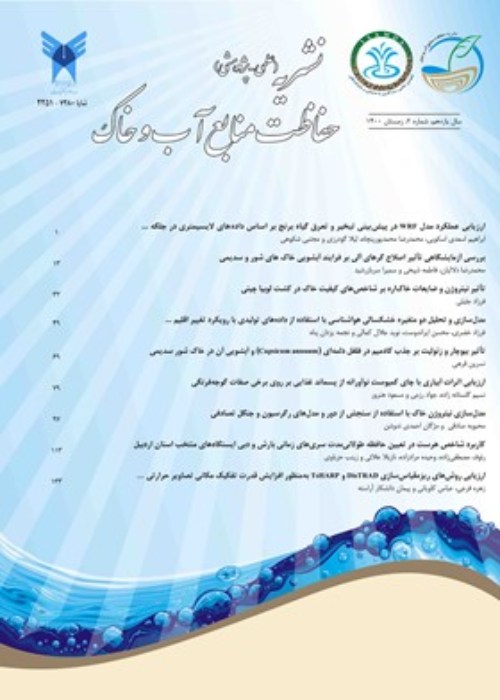The Effect of Foliar Application of Proline and Glycine-Betaine on Growth Indices, Proline Content and Enzymatic Activity of Aromatic Geranium (Pelargonium Graveolens) Under Low Water Stress
Aromatic geranium is an ornamental perennial plant which its essential oil is used in perfumery, cosmetics, food and pharmaceutical industries. Water scarcity is one of the most important environmental stresses limiting plants’ growth and yield, which greatly impacts the morphophysiological, biochemical and enzymatic properties of plants and limits their development and survival. Using organic osmolytes such as proline and glycine-betaine increase the capacity and speed of photosynthesis, absorb ions such as magnesium and potassium, prevent the degradation of pigment-protein compounds, maintain plant pigments, strengthen the antioxidant system, and impact in inhibiting the adverse effects of water scarcity in plants. Thus, the aim of this study is to determine the best substance and effective concentration improving the quality and aromatic geraniums flowering under water scarcity stress.
Aromatic geranium cuttings were kept in commercial greenhouses with a temperature of about 17 to 20 Cᵒ, 60 to 70% relative humidity and light intensity of about 50 to 60 µm/m2S in Karaj city. Feeding with Hoagland solution was done once a week and in order to measure the soil moisture, the potting system was used, and irrigation was carried out based on the soil weight change according to the determined field capacity (FC). Foliar spraying with proline and glycine betaine (0, 50 and, 100 mg/l) was applied for a month after two weeks of placing the cuttings in pots and 24 hours of being at different levels of low scarcity stress (25, 50, 75 and, 100% field capacity), sequently. After completing the treatments, sampling and evaluating of traits such as fresh and dry weight of shoots and roots, petals anthocyanin, total leaf chlorophyll, proline and activity of superoxide dismutase and peroxidase enzymes were performed. The experiment was performed in 2019 as a factorial experiment in a completely randomized statistical design with two factors of applying water scarcity stress and spraying with proline and glycine-betaine and their interaction. Then, data were analyzed using SPSS, the means were compared with Duncan's multiple domain and graphs were drawn in Excel.
Data means comparison showed that the highest fresh and dry weight of shoots with 67.25 and 8.53 g and the highest fresh and dry weight of roots with 15.62 and 3.45 g were observed in 100% FC (control) and the lowest shoot fresh and dry weight with 44.76 and 4.45 g and the lowest fresh and dry weight of roots with 10.57 and 1.17 g, were in 25% FC treatment (without foliar application). Also, the highest and lowest petals anthocyanin with 2.8925 and 1.5775 mg/g FW and total leaf chlorophyll with 15.3735 and 11.1632 mg/g FW were in 100% FC (control) and 25% FC treatment (without foliar application). The highest and lowest proline levels were 3.84 and 1.67 mg/g of FW in 25% FC treatment (without foliar application) and 75% FC treatment + 100 mg/l of proline. The highest activity of superoxide dismutase and peroxidase enzymes with 2.97 and 16.52 UE/g of FW in 75% FC + glycine-betaine 100 mg/l treatment and the lowest with 1.12 and 12.93 UE/g FW in 25% FC treatment (without foliar application), was obtained.
The results demonstrate that the fresh and dry weight of shoots and roots decreased with increasing water scarcity stress, which this reduction was in 25% or more of field capacity and foliar application of plants with glycine betaine and proline inhibited the negative effects of stress at a concentration of 100 mg/l, both combinations were more visible. Petal anthocyanin and total leaf chlorophyll dropped with rising water scarcity stress and, treatment of plants with glycine betaine and proline had an effective role in ameliorating plant pigments. In addition, proline levels are increased by water scarcity stress. The highest enzyme activity was in 75% FC and with increasing water scarcity stress, enzyme activity reduced. Foliar application of plants with glycine betaine and 100 mg/l proline reduced the negative effect of water stress in 50 and 75% FC compared to 25% FC. Hence, according to the research results, the use of organic osmolytes such as glycine betaine and proline can be recommended to decrease the negative effects of water scarcity stress in ornamental plants.
- حق عضویت دریافتی صرف حمایت از نشریات عضو و نگهداری، تکمیل و توسعه مگیران میشود.
- پرداخت حق اشتراک و دانلود مقالات اجازه بازنشر آن در سایر رسانههای چاپی و دیجیتال را به کاربر نمیدهد.


